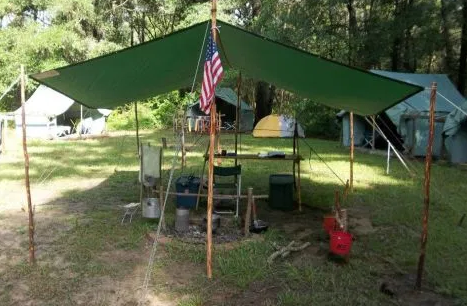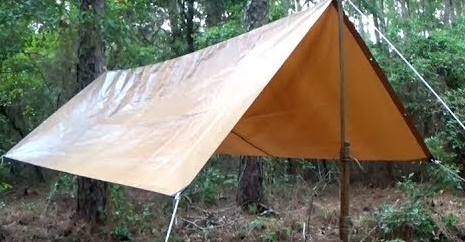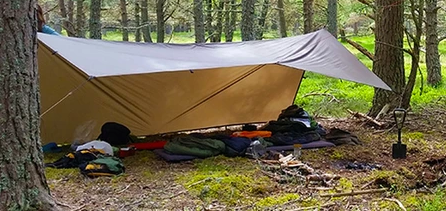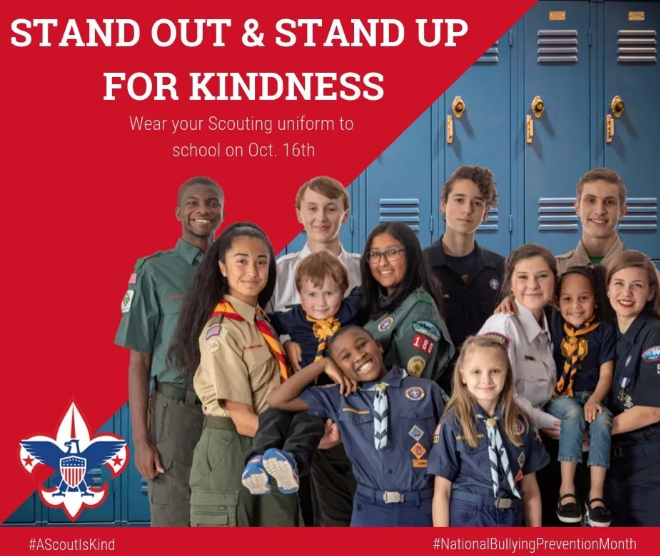-
Posts
1179 -
Joined
-
Last visited
-
Days Won
32
Content Type
Profiles
Forums
Articles
Store
Posts posted by mrkstvns
-
-
There are 3 elements to recruiting in any organization: attraction, conversion, and retention.
Attraction is the realm of marketing: get the word out and pull people in. Retention is about delivering on your promise and giving value to the members.
But conversion....that's where things get interesting because it's all about the vibe in the unit and showing people your energy and passion so they want to be part of the fun.
Make newcomers feel welcome and show them the value that can be theirs to share, and you'll have 'em hooked!
That's why I was so impressed by Bryan on Scouting's story of a Michigan pack that created "welcome bags". Great way to involve the cubs in their pack's recruitment campaign!
Story: https://blog.scoutingmagazine.org/2019/10/23/the-ingenious-way-this-cub-scout-pack-welcomes-new-members/ -
Different councils run their Scouting for Food drives at different times of the year.
National Capital Area Council usually does theirs in the fall. Ditto Last Frontier Council, which will be passing out flyers Nov 2 and collecting cans Nov 9.
Sam Houston Area Council passes out flyers last weekend in January and collects cans first weekend in February.
I wonder what month is the MOST effective time to do it....do you rake in more donations early in the fall? Or more in the middle of winter, after the holidays are over and done with?
I wonder which council has the BIGGEST Scouting for Food drive....
-
Just to put this in perspective, although EEE is a serious disease, it is NOT "rampant" or common in any way --- even in Massachusetts, which has more cases than other states.
According to the U.S. Census Bureau, the population of Massachusetts is 6,902,149. According to the Massachusetts Department of Health, there have been 9 confirmed cases of EEE, resulting in 1 death. (There were also 7 cases of EEE infecting horses, and 1 case confirmed in a goat.)
Obviously, this means your chance of dying of EEE in Massachusetts is 1 in 6,902,149.
Your chance of contracting the disease in Massachusetts is just under a in 766,905. That is close to your odds of being struck by lightning while in Wyoming (about 1 in 1 million).
Do those kinds of numbers actually justify cancelling activities and creating a whole lot of hoopla?
-
1 hour ago, mrkstvns said:
As I was reading some news articles about scouting, I came across this story about 2 BSA troops that were working together to host a Spaghetti Dinner. Sounds like a win-win fundraiser all the way around!
...and for some reason, I had a brain fart and forgot to include the link so you could see the source...this was 2 troops in Connecticut...
https://patch.com/connecticut/woodbury-middlebury/middlebury-boy-scout-pasta-dinner-coming -
A wise old scoutmaster used to love saying, "Team work makes the dream work."
I have no idea whether he made up that quote or borrowed it, but the truth behind it is apparent in myriad situations (including fundraising).
If you've got an idea for a fundraising activity, but you think that your unit might be too small to support it, a good solution is to simply team up with another similarly sized unit and work together, then split the proceeds.
As I was reading some news articles about scouting, I came across this story about 2 BSA troops that were working together to host a Spaghetti Dinner. Sounds like a win-win fundraiser all the way around!
-
 1
1
-
-
7 hours ago, karunamom3 said:
Yes! Our district made it a weekend camping program. We had 6 scouts complete the radio merit badge and 4 begin pioneering. We are in NJ and we connected to folks, some scouts, in Maine, Florida, Tennessee, Ohio, Louisiana, Canada and Germany. It was open to cubs, scouts and venturers. It was cold, but lots of fun!
This is really cool! I imagine most councils and districts could find a local radio club willing to come out to a scout activity with a load of radios the scouts could use to "talk to the world". Thanks for sharing! I loved the picture too!
BTW: You can find amateur radio clubs in your area here: http://www.arrl.org/find-a-club
Might be a handy thing to keep in mind for next fall...-
 1
1
-
-
I found a very nice "Scoutmaster Minute" on the Kansas City Star website. It's a little long for my tastes, but it incorporates a story of an Olympic athlete inside a story of a young scout. I like it!
https://www.kansascity.com/news/local/community/joco-913/joco-diversions/article235999268.htmlMy older son’s Scout leader was telling some of the other parents that he couldn’t make it to the upcoming meeting. Another one of those obligations had chased him down for that night, so he was looking for a fill-in to give the “Scoutmaster’s minute,” a story at the end of the meeting with a moral for the boys and girls to leave with.
I love a good short story, and no sooner had I started thinking about where I might look for some good prospects than I found myself down on the schedule to tell one the next night.
The past few weeks have been especially busy for me, to the point where I’ve been thinking of dropping some of my less essential obligations — projects outside work that other people will probably step up for, or at least things that won’t stop the world from spinning if they’re left undone.
So I was relieved to find something interesting to tell the kids about after just a few minutes of poking around the internet.
It was John-Stephen Akhwari’s marathon run at the 1968 Olympics. You might already know his story, but bear with me while I get everyone else caught up.
Akhwari didn’t clock a great time. In fact, he crossed the finish line more than an hour after the medalists, finishing last, in 57th place. Even the 56th-place runner had 19 minutes on him.
That wasn’t entirely his fault.
See, Akhwari and a few other runners had collided on the track and down went Tanzania’s only competitor in the race. The fall dislocated his right knee. They say observers expected him to limp off the track and into obscurity once he was bandaged up.
But Akhwari stood up on that knee and pushed through the pain until he’d put every inch of those 26.2 miles behind him.
When someone asked him later why he didn’t give up — as 18 other runners did that day — he gave a simple answer: His compatriots hadn’t sent him 9,500 miles to Mexico City to start the marathon. They sent him 9,500 miles to finish it.
That, I told my son’s troop, is how to handle the obligations you agree to take on for people: Once you commit to putting something on your list, do everything you can to check it off.
Then one of the young faces in the group snagged my attention. It belonged to a kid who’d hiked a couple of miles into town from camp with the rest of the troop last summer.
It was no marathon, but anyone could see that the loop back to camp seemed like one to this boy as he forced one aching leg in front of the other in utter exhaustion. Three adults slowed the pace to his while the rest of the troop disappeared down the trail.
The boy knew that if he really wanted to quit, all he had to do was refuse to move and we’d call a car to take him back to camp. But he trudged through the muggy afternoon and into dusk until he finally reached his cot on his own steam.
Miserable as he looked that evening, he told us later how proud he was that he hadn’t given up. And when his mom asked what he did at the camp she’d saved to send him to, he surely had a story for her.
That boy didn’t need to hear the lesson of John-Stephen Akhwari. He already had it by heart.
But I needed a reminder of that boy’s story.
It’s one thing for a trained marathoner to persevere as the world watches. It’s another thing entirely for a boy who doesn’t like hiking to burn through his meager reserves so he doesn’t let his mom down.
Facing him the other night, it seemed like I can carry those extra obligations I signed up for at least a little further down the trail.
-
 1
1
-
-
This past weekend was BSA's annual Jamboree on the Air (JOTA). Did any of y'all participate?
Story about this year's JOTA:
https://www.ksby.com/news/local-news/northern-slo-county-boy-scouts-connect-with-scouts-overseas-via-radio-for-jota-joti-jamboree -
Das sieht lecker aus!
You are a more ambitious camp chef than me. I'd probably just grill a few bratwursts and serve 'em up with sauerkraut and some good German mustard. Never tried serving them on a scout campout though....mostly because I'd have to leave the beer at home, and Oktoberfest without beer is like a night without moonshine!
-
 1
1
-
-
Browing around on the Scouting Magazine website (scoutingmagazine.org), I came across a post about how to set up a dining fly. Very simple: if you've got a tarp and some rope, you've got the makings of a group shelter. Nothing to it.
For some of us old timers, it's simply the way we setup our camps on each and every campout. But as I was reading the article, it occurred to me, never once in the past 10 years have I seen my son or his friends set up a patrol dining fly that way. The troop has several of these EZ-Up canopy shelters, and the boys just pop those up when we're at a campsite taht doesn't already have a permanent pavilion on site (as too many over-developed "camping sites" seem to do).
The tarp is an amazingly simple thing, so it can be used in myriad ways to adapt to whatever conditions you find yourself camping in...
1. Bring some poles (or find appropriate length sticks) and you can set it up free standing.
- 2 poles is good, 6 poles is even better (2 8' high poles and 4 6' high poles), but 1 is possible too...2. If you're in dense woods, just find a few stout and heart trees, and tie a ridgeline between the trees, then tie some lines to stakes to keep it taut. (remember that the ridgeline should also be tied with taut line hitches inside so you can tighten it up if it starts to go slack.
Here's a few pictures of how the tarps can be set up to make a patrol dining shelter:
6 POLES, FREE STANDING:

1 POLE IN FRONT, TREE IN BACK:

NO POLES - JUST TREES:

-
 1
1
-
-
On 10/20/2019 at 12:31 AM, RememberSchiff said:
Tweezers from my Swiss army knife works for me, that and staying on the trail.
...where's the adventure in staying on the trail???
-
A group of Girl Scouts is building habitats for wild bees (i.e., not "honey bees").
https://grist.org/science/these-girl-scouts-are-saving-wild-bees-one-hotel-at-a-time/This is a very interesting project because it addresses a significant, but often overlooked, aspect of the declining pollinator problem: we often focus on honey bee populations, but forget that there are a lot of bee species, and many of these species are declining in lock-step with the domesticated honey bee populations.
I think that many Boy Scouts could look into this as a possible Hornaday project or Eagle project...a good project idea is a good project idea!
-
Interesting question!
I can't imagine that such things don't exist since ASL is one of the "languages" in which you can earn an Interpreter strip.
-
 1
1
-
-
5 minutes ago, ParkMan said:
... This is why many council scouters I know talk about the inverted pyramid model The unit is at the top of the organization chart. The rest - districts, councils, & national are here to provide you support. ...
aka, "servant leadership".
-
 1
1
-
 1
1
-
-
11 minutes ago, Eagledad said:
One other trick I learned with any sleeping bag is use a sheet. Even cotton sheets are a good barrier to absorb most of the dirt. Sheets don't weigh much, dry quickly and are can make hot summer night more comfortable next to a tent mate when the sleeping bag is too hot. Noncotton sheets are common today.
Good advice!
I've seen "sleeping bag liners" for sale in outdoor stores, but I'm not sure I really see the point since I have a lot more choices in fabrics and weights if I just go to a department store and buy some sheets off the shelf. Another advantage to doing that is it can provide more warmth in winter months, probably adding an extra 5 degrees or so to the temperature rating of a typical bag.
-
Just thought I'd point out that many councils already have a program in place to help get scout uniforms into the hands of kids whose families might struggle to provide them. In the Houston area, this is called the "Uniform Exchange". Info about how it works is here:
https://shac.org/uniform-exchange
Our troop does something similar. We have a bin where scouts who outgrow their uniforms, or scouts who age out of the program, can toss their uniforms in a bin and they are made available to scouts bridging into the troop.
I applaud the efforts of Latin Scot, Momleader, and anyone else who grabs the bull by the horns and helps rescue uniforms for re-use by those who need them.
-
BSA is asking scouts to wear their scout uniform to school tomorrow (October 16) in an effort to stand up to bullying by showing other students that they have a friend in their midst.
What do you think? Is this effective? Will scouts and parents buy in and participate?

-
An FAQ document about the upcoming background check process is available on the Bryan on Scouting blog:
https://blog.scoutingmagazine.org/2019/10/14/rechecks-of-criminal-backgrounds-explained/This document describes why the forms are required and how the process will work.
Basically, they'll do background checks on all scouters in 2020, then every 5 years thereafter.
-
16 hours ago, ParkMan said:
Now that I read this again, I realize that there is an effort to overnghter to distinguish from day camps. I don't think it's needed. If one said "pack camping", I think we all understand that implies spending the night.
There are other things that can be "overnighters" but that I don't consider to be camping.
My son's pack did some "overnighters" like a night in the Zoo, or a sleep aboard on the USS Lexington. These are fun things for the boys to do, but they're not in the woods, don't involve setting up tents, don't involve cooking their meals, and similar things that really define "camping".
Just saying...
-
I try not to wash my sleeping bag very often because it's kind of a pain, and it always seems to feel a bit lumpy afterwards. Still, there are plenty of times where a good wash and dry is the only thing to do, short of buying a new one.
GENERALLY...
After each campout, I open it up, spray it with Febreze and hang it over the rail of my deck to air out.WHEN IT GETS TO SMELLY/WET/SWEATY/DIRTY...
I hand-wash it in a tub using laundry soap, then I lay it out on the deck to dry. Usually, I wash it in the morning and leave it out all day in the sun.I NEVER...
Wash it in a washing machine and I never dry it in a clothes dryer.
I don't take it to a cleaners.What do you do to keep the sleeping bag clean and fresh and lasting as long as possible?
-
I don't know if BSA made a mistake in their California listing, or what, but the link they have doesn't seem to go anywhere that's good for high adventure, HOWEVER, a different council than BSA points to DOES conduct outstanding high adventure programs on Catalina Island.
The USEFUL link to these is:
http://www.campemeraldbay.org/emerald-bay/high-adventure-program -
Do you ever camp in places that have no nearby source of potable water?
If so, how much water do you bring with you?
This is not a hypothetical and it is not a backcountry trip --- we can drive a car up to near the site. 2 nights, 30 participants.
If I bring 30 gallons, will it be enough to cover cooking, dishwashing, drinking for 2 nights? How much would you bring?
-
9 hours ago, Scouter4Family said:
I am doing research and trying to figure the best balance for my situation, but am also finding that researching camps is difficult because there seems to be some hidden gems out there that don’t show up on a google search.

Quite right. Google search will turn up some possibilities, but it misses a lot and your search results are badly organized with those camps that had the most SEO-aware webmaster showing up first (not camps that are the best, or that have the most exciting programs).
A good site to begin your search for all those "hidden gems" is https://tap.scouting.org/
Near the bottom of the page is a link to "Council High Adventure Camps". This is an excellent resource listing more HA camps than you ever knew existed!
-
 1
1
-
-
2 minutes ago, qwazse said:
So, I think I'm pretty neutral. If BSA says don't camp as a pack for two nights in a row without council approval, suck it up. It ain't killing your program.
Well, it might not be killing your pack's program, since evidently you had a lame pack that didn't even bother to camp. (Sorry, gotta call a spade a spade, after all, a scout IS trustworthy).
My son's pack camped twice per year, so when the boys bridged to a scout troop, they were prepared to get right into an active, productive outdoor program. Putting restrictions on that kind of quality program *IS* a bad thing and if that's what BSA wants, they RICHLY deserve any and all criticism that comes their way.



Sustainable footwear
in Equipment Reviews & Discussions
Posted
We hear about sustainability in almost every aspect of our lives, but I still get surprised when it comes up in an unexpected context.
I was out shopping for some comfy new shoes for light (non-mountainous) hiking trips, and came across a label on a shoe box proclaiming the product to be "vegan".
I was mighty glad to see that because I like knowing that if I get lost in the woods, I can eat my shoes without feeling guilty.